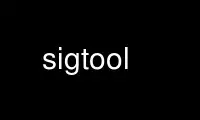
This is the command sigtool that can be run in the OnWorks free hosting provider using one of our multiple free online workstations such as Ubuntu Online, Fedora Online, Windows online emulator or MAC OS online emulator
PROGRAM:
NAME
sigtool - signature and database management tool
SYNOPSIS
sigtool [options]
DESCRIPTION
sigtool can be used to generate MD5 checksums, convert data into hexadecimal format, list
virus signatures and build/unpack/test/verify CVD databases and update scripts.
OPTIONS
-h, --help
Output help information and exit.
-V, --version
Print version number and exit.
--quiet
Be quiet - output only error messages.
--stdout
Write all messages to stdout.
--hex-dump
Read data from stdin and write hex string to stdout.
--md5 [FILES]
Generate MD5 checksum from stdin or MD5 sigs for FILES.
--sha1 [FILES]
Generate SHA1 checksum from stdin or SHA1 sigs for FILES.
--sha256 [FILES]
Generate SHA256 checksum from stdin or SHA256 sigs for FILES.
--mdb [FILES]
Generate .mdb signatures for FILES.
--html-normalise=FILE
Create normalised HTML files comment.html, nocomment.html, and script.html in
current working directory.
--utf16-decode=FILE
Decode UTF16 encoded data.
--vba=FILE
Extract VBA/Word6 macros from given MS Office document.
--vba-hex=FILE
Extract Word6 macros from given MS Office document and display the corresponding
hex values.
-i, --info
Print a CVD information and verify MD5 and a digital signature.
-b, --build
Build a CVD file. -s, --server is required.
--max-bad-sigs=NUMBER
Maximum number of mismatched signatures when building a CVD. Default: 3000
--flevel
Specify a custom flevel. Default: 77
--cvd-version
Specify the version number to use for the build. Default is to use the value+1 from
the current CVD in --datadir. If no datafile is found the default behaviour is to
prompt for a version number, this switch will prevent the prompt. NOTE: If a CVD
is found in the --datadir its version+1 is used and this value is ignored.
--no-cdiff
Don't create a .cdiff file when building a new database file.
--unsigned
Create a database file without digital signatures (.cua).
--server
ClamAV Signing Service address (for virus database maintainers only).
--datadir=DIR
Use DIR as the default database directory for all operations.
--unpack=FILE, -u FILE
Unpack FILE (CVD) to a current directory.
--unpack-current
Unpack a local CVD file (main or daily) to current directory.
--diff=OLD NEW, -d OLD NEW
Create a diff file for OLD and NEW CVDs/INCDIRs.
--compare=OLD NEW, -c OLD NEW
This command will compare two text files and print differences in a cdiff format.
--run-cdiff=FILE, -r FILE
Execute update script FILE in current directory.
--verify-cdiff=FILE, -r FILE
Verify DIFF against CVD/INCDIR.
-l[FILE], --list-sigs[=FILE]
List all signature names from the local database directory (default) or from FILE.
-fREGEX, --find-sigs=REGEX
Find and display signatures from the local database directory which match the given
REGEX. The whole signature body (name, hex string, etc.) is checked.
--decode-sigs=REGEX
Decode signatures read from the standard input (eg. piped from --find-sigs)
--test-sigs=DATABASE TARGET_FILE
Test all signatures from DATABASE against TARGET_FILE. This option will only give
valid results if the target file is the final one (after unpacking, normalization,
etc.) for which the signatures were created.
--print-certs=FILE
Print Authenticode details from a PE file.
EXAMPLES
Generate hex string from testfile and save it to testfile.hex:
cat testfile | sigtool --hex-dump > testfile.hex
CREDITS
Please check the full documentation for credits.
Use sigtool online using onworks.net services
